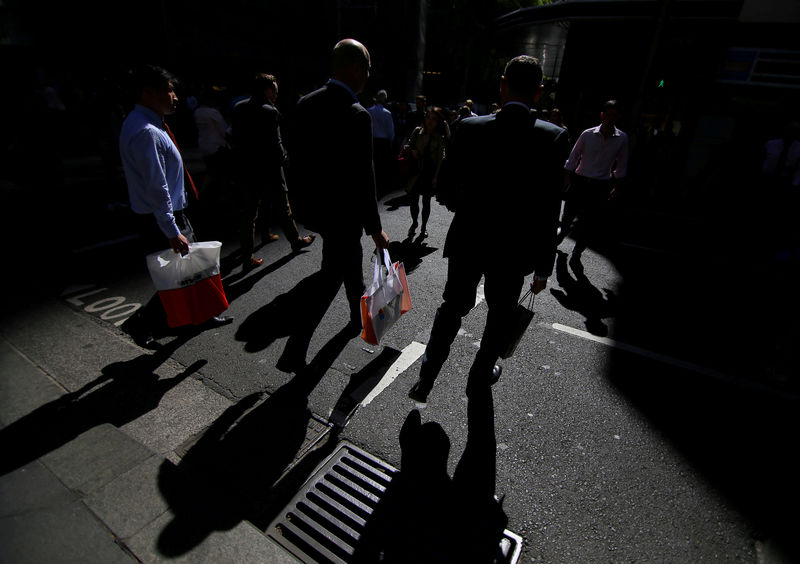 © Reuters. FILE PHOTO: Workers walk on the streets of Sydney, Australia
© Reuters. FILE PHOTO: Workers walk on the streets of Sydney, AustraliaBy Wayne Cole
SYDNEY (Reuters) – Australia’s economy is forecast to grow solidly over the next couple of years on booming infrastructure spending and strong resource exports, though trade tensions and falling house prices are a clear hurdle ahead.
Economists polled by Reuters Oct 3-10 forecast Australia’s A$1.85 trillion ($1.3 trillion) of annual gross domestic product (GDP) would expand 3.2 percent in 2018, up from 2.9 percent in a July poll.
The revision reflects a surprisingly strong first half as consumers, exporters and government all combined to lift annual growth to a six-year top of 3.4 percent.
Expansion has been underpinned by brisk population growth of 1.6 percent a year, twice the rich-world average, which in turn is driving spending on infrastructure.
Analysts forecast growth of 2.8 percent in 2019 and 2.7 percent in 2020, an outcome that would take Australia’s stretch without a technical recession to a remarkable 29 years.
Much, however, depends on Beijing successfully navigating its trade conflict with the United States. China is Australia’s biggest single export market and a key driver of prices for its many resources.
“Australia’s exports are much more tied into China’s domestic demand than its manufactured export supply chain,” said HSBC’s head of Australian economics, Paul Bloxham.
“We see commodity prices rising further from here as China boosts its infrastructure spending in response to rising trade barriers.”
Just this week, the International Monetary Fund predicted growth of 3.2 percent this year and 2.8 percent in 2019 even while acknowledging the threat from global trade tensions.
Domestically a key risk is that falling property prices undermine household wealth and spending power at a time when wage growth is unusually subdued and debt at record highs.
“We have lowered our house price forecasts, but fundamentally are still forecasting a soft landing – with prices around 15-20 percent above where they were three years ago,” said NAB chief economist Alan Oster.
Crucially, the Reserve Bank of Australia (RBA) is all too aware of the dangers in the housing market and has signalled its intention to keep interest rates at a record low of 1.5 percent for some time to come.
Fortunately, there is plenty of scope to stay accommodative as inflation remains well contained, having run below the RBA’s 2-3 percent target band for 10 straight quarters.
The latest poll showed analysts expected inflation of just 2.0 percent for this year, before rising only modestly to 2.2 percent for both 2019 and 2020.
(For other stories from the Reuters global economic poll )
($1 = 1.4144 Australian dollars)
(Polling by Khushboo Mittal and Anisha Sheth; Editing by Nick Macfie)
Fusion Media or anyone involved with Fusion Media will not accept any liability for loss or damage as a result of reliance on the information including data, quotes, charts and buy/sell signals contained within this website. Please be fully informed regarding the risks and costs associated with trading the financial markets, it is one of the riskiest investment forms possible.
Source: Investing.com


























